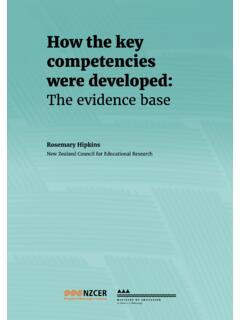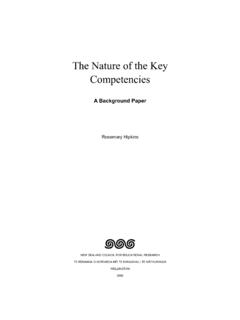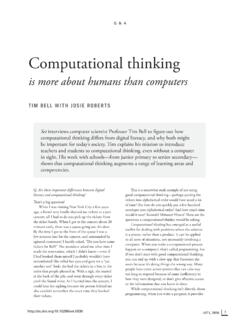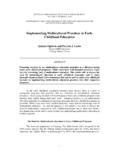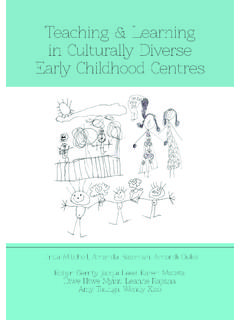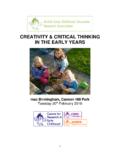Transcription of The role and potential of ICT in early childhood …
1 The role and potential of ICT in early childhood education A review of New zealand and international literature NEW zealand COUNCIL FOR EDUCATIONAL RESEARCH TE R NANGA O AOTEAROA M TE RANGAHAU I TE M TAURANGA WELLINGTON 2004 Prepared for: Prepared by: Ministry of education Rachel Bolstad early childhood education New zealand Council for Educational Research Tertiary, Curriculum, Teaching and Learning PO Box 3237 45-47 Pipitea Street Wellington Thorndon Wellington Ministry of education November 2004 ISBN Print 0-478-13236-0 Web 0-478-13237-9 Acknowledgements We would like to thank the following people who contributed to the production of this review.
2 From the Ministry of education : Patricia Nally, Louise Alliston, Eliza Avery, Melissa Brewerton, Rachel Currie, Patricia Laurenson, Carol Moffat, and Lisa Oldridge. From the New zealand Council for Educational Research: Linda Mitchell, Cathy Wylie, Christine Williams, Kristina Louis, Susan Tompkinson, Johanne McComish, Hilary Ferral, Diane Mara, and Shelley Carlyle. We are also grateful to all those from the early childhood education sector who provided references and suggested information sources for this review. i ii Table of Contents Executive summary vii 1.
3 Introduction 1 What is ICT? 1 Why does ICT matter in early childhood education ? 2 ICT already affects the people and environments that surround young children s learning 2 ICT offers new opportunities to strengthen many aspects of early childhood education practice 2 There is support for the development and integration of ICT into education policy, curriculum, and practice across the whole education sector 3 What roles can ICT play in ECE? 5 Developing ICT capability in the ECE sector 7 Supporting children s ICT capability and ICT literacy 7 Supporting practitioners ICT capability and ICT literacy 8 The structure of this review 9 Summary of Section 1 10 2. Characteristics of the literature on ICT in early childhood education 13 Kinds of research on ICT in early childhood education 13 Effects research 14 Investigations of children s behaviour and social interactions around computers 14 Research into children s experiences of ICT in early childhood education settings and at home 14 Research on practitioners professional learning in, or through, ICT 15 Case studies and exemplars of the use of ICT in early childhood education settings 15 A comment about these categories of research 16 Definitions of early childhood in the literature 17 Summary of Section 2 17 3.
4 ICT and young children: the key issues 19 Why use ICT with young children? 19 Areas of concern about children s computer use 20 How can ICT enrich the early childhood learning environment? 25 What is developmentally appropriate use of ICT with young children? 26 ICT and children s play 28 Using ICT to support language development 30 Using ICT to support mathematical thinking and problem-solving 32 Supporting children from diverse cultural or language backgrounds 32 Supporting children with special learning needs 33 Knowing when and how to use ICT with children 34 iii Summary of Section 3 34 4.
5 We have the technology, now what? Practitioners learning to use ICT in early childhood education settings 37 The introduction of ICT in early childhood settings 37 early childhood education practice with ICT 38 Examples from practice 42 Using ICT to document, share, and reflect on children s learning 42 Using ICT to support critical reflection by children, practitioners, and families 44 Using ICT to build or strengthen networks between early childhood education centres 46 Taking a thematic approach to ICT use in the early childhood classroom 47 Summary of Section 4 49 5. Conditions for effective teacher ICT professional development 51 Conditions for effective teacher professional development 51 ICT professional development for early childhood educators 52 Learning to use ICT in early childhood initial teacher education 53 Summary of Section 5 55 6.
6 Using ICT to support planning, administration, and information management 57 Using ICT to create and maintain electronic records and databases within a centre 58 Sharing information between centres and other organisations and agencies 58 Summary of Section 6 60 7. Current use of ICT in New zealand early childhood education centres 61 The survey sample 61 Access to ICT 62 Staff ratings of their ICT resourcing and access 63 Operating systems and software 64 Children s use of ICT 64 Use of ICT to support children s learning 65 Supporting children s learning 65 Documenting children s learning 65 Use of ICT to communicate with parents, caregivers, and wh nau 66 Staff use of ICT for their own learning 66 Staff readiness and confidence to use ICT 67 Support and professional development 67 Technical problems with ICT use 68 Use of ICT for administration 68 Summary of Section 7 70 8.
7 Discussion and conclusion 71 Key findings from the review 71 ICT and young children 71 Using ICT to enhance the early childhood learning environment 72 iv Effective ICT professional development for early childhood educators 73 The use of ICT for administration and information management in early childhood education 74 ICT access and infrastructure in New zealand early childhood education settings 74 Implications of these findings for further development of ICT in New zealand early childhood education 75 Areas for further New zealand research 76 Drawing together research on role and learning benefits of ICT use in New zealand early childhood education settings 76 Children s and families experiences of ICT in the early childhood education settings, and the role of ICT for connecting children s home and early childhood education setting experiences 77 Research on the contribution of ICT to children s thinking and language use 78 Research about the use of ICT for administration and planning.
8 And information sharing between early childhood education services and other agencies 79 References 81 Tables Table 1 Possible roles for ICT in early childhood education 6 Table 2 The DATEC project principles for developmental appropriateness of ICT 28 Table 3 Questions for assessing the contribution of computer games to children s play (adapted from Verenikina et al, 2003) 30 Table 4 Levels of quality of ICT use in an early childhood education setting (Adapted from Brooker, 2003 and Sheridan and Pramling Samuelsson, 2003) 41 Table 5 Survey responses by type of service 62 Table 6 Managers and teachers access to ICT in the early childhood centre 63 Table 7 Teachers ratings of their ICT resourcing and access 63 Table 8 Staff use of ICT for own learning 66 Table 9 Problems with teachers and manager s readiness to use ICT 67 Table 10 Technical problems with ICT use 68 Table 11 Electronic database searches for literature on ICT in early childhood education 87 Appendices Appendix 1: literature review methodology 87 Appendix 2.
9 Sources for further information 89 v vi Executive summary This literature review was commissioned as part of the process of developing an ICT strategy for early childhood education in New zealand . The review seeks to inform both the early childhood education sector and the Ministry of education about the role and potential of ICT in early childhood education . It includes literature on children s and adults use of ICT in early childhood education settings, and comments on the role of ICT with respect to teaching and learning, professional development and teacher education , sector capability, administration, infrastructure, and information management and communications.
10 Data from NZCER s 2003 national survey of early childhood education services are used to develop a picture of current access to and use of ICT in New zealand early childhood education . What is ICT and why does it matter in early childhood education ? ICT can be defined as anything which allows us to get information, to communicate with each other, or to have an effect on the environment using electronic or digital equipment . In early childhood education (ECE), the term ICT could include computer hardware and software, digital cameras and video cameras, the Internet, telecommunication tools, programmable toys, and many other devices and resources. The literature suggests at least three reasons why ICT matters in early childhood education .



